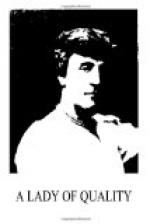Ah, what a face he had, and how his eyes burned as they rested on her. It was such a look she met, that for a moment she could not find speech, and he himself spoke as a man who, through some deep emotion, has almost lost his breath.
“My Lady Dunstanwolde,” he began; and then with a sudden passion, “Clorinda, my beloved!” The time had come when he could not keep silence, and with great leapings of her heart she knew. Yet not one word said she, for she could not; but her beauty, glowing and quivering under his eyes’ great fire, answered enough.
“Were it not that I fear for your sake the beast you ride,” he said, “I would lay my hand upon his bridle, that I might crush your hand in mine. At post-haste I have come from France, hearing this thing—that you endangered every day that which I love so madly. My God! beloved, cruel, cruel woman—sure you must know!”
She answered with a breathless wild surrender. “Yes, yes!” she gasped, “I know.”
“And yet you braved this danger, knowing that you might leave me a widowed man for life.”
“But,” she said, with a smile whose melting radiance seemed akin to tears—“but see how I have beaten him—and all is passed.”
“Yes, yes,” he said, “as you have conquered all—as you have conquered me—and did from the first hour. But God forbid that you should make me suffer so again.”
“Your Grace,” she said, faltering, “I—I will not!”
“Forgive me for the tempest of my passion,” he said. “’Twas not thus I had thought to come to make my suit. ’Tis scarcely fitting that it should be so; but I was almost mad when I first heard this rumour, knowing my duty would not loose me to come to you at once—and knowing you so well, that only if your heart had melted to the one who besought you, you would give up.”
“I—give up,” she answered; “I give up.”
“I worship you,” he said; “I worship you.” And their meeting eyes were drowned in each other’s tenderness.
They galloped side by side, and the watchers looked on, exchanging words and glances, seeing in her beauteous, glowing face, in his joyous one, the final answer to the question they had so often asked each other. ’Twas his Grace of Osmonde who was the happy man, he and no other. That was a thing plain indeed to be seen, for they were too high above the common world to feel that they must play the paltry part of outward trifling to deceive it; and as the sun pierces through clouds and is stronger than they, so their love shone like the light of day itself through poor conventions. They did not know the people gazed and whispered, and if they had known it, the thing would have counted for naught with them.




